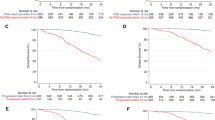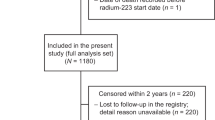Abstract
One of the current challenges in the evaluation of novel agents for the treatment of advanced prostate cancer is the identification of a surrogate end point for overall survival (OS). Prostate-specific antigen (PSA) levels have been used as a screening tool and a biomarker of response to both hormonal and cytotoxic agents. However, PSA levels do not seem to be a suitable surrogate end point for OS in trials of targeted agents for castrate-resistant prostate cancer (CRPC). These findings suggest the need for adopting measures of efficacy that more accurately reflect the mechanisms of action of these agents in phase II trials, in order to realize improvements in OS in the phase III setting. The Prostate Cancer Clinical Trials Working Group (PCWG2) have recently made recommendations for the design of future trials and advised that PSA levels should not be the sole criterion on which to base clinical decisions. Here, we appraise the end points that have been used in phase II and III trials in patients with CRPC, and highlight the need for the adoption of the PCWG2 guidelines, the recommendations of which include radiographic imaging, in addition to bone scintigraphy, and symptomatic or radiographic disease progression criteria.
This is a preview of subscription content, access via your institution
Access options
Subscribe to this journal
Receive 4 print issues and online access
$259.00 per year
only $64.75 per issue
Buy this article
- Purchase on Springer Link
- Instant access to full article PDF
Prices may be subject to local taxes which are calculated during checkout
Similar content being viewed by others
References
Prentice RL . Surrogate endpoints in clinical trials: definition and operational criteria. Stat Med 1989; 8: 431–440.
Collette L . Prostate-specific antigen (PSA) as a surrogate end point for survival in prostate cancer clinical trials. Eur Urol 2008; 53: 6–9.
Bubley GJ, Carducci M, Dahut W, Dawson N, Daliani D, Eisenberger M et al. Eligibility and response guidelines for phase II clinical trials in androgen-independent prostate cancer: recommendations from the Prostate-Specific Antigen Working Group. J Clin Oncol 1999; 17: 3461–3467.
Newling DWW . Issues with the use of prostate-specific antigen as a surrogate end point in hormone-resistant prostate cancer. Eur Urol Suppl 2009; 8: 13–19.
Scher HI, Mazumdar M, Kelly WK . Clinical trials in relapsed prostate cancer: defining the target. J Natl Cancer Inst 1996; 88: 1623–1634.
Petrylak DP, Ankerst DP, Jiang CS, Tangen CM, Hussain MH, Lara PN et al. Evaluation of prostate-specific antigen declines for surrogacy in patients treated on SWOG 99-16. J Natl Cancer Inst 2006; 98: 516–521.
Tannock IF, de Wit R, Berry WR, Horti J, Pluzanska A, Chi KN et al. Docetaxel plus prednisone or mitoxantrone plus prednisone for advanced prostate cancer. N Engl J Med 2004; 351: 1502–1512.
Beer TM, Ryan CW, Venner PM, Petrylak DP, Chatta GS, Ruether JD et al. Double-blinded randomized study of high-dose calcitriol plus docetaxel compared with placebo plus docetaxel in androgen-independent prostate cancer: a report from the ASCENT Investigators. J Clin Oncol 2007; 25: 669–674.
Lin AM, Hershberg RM, Small EJ . Immunotherapy for prostate cancer using prostatic acid phosphatase loaded antigen presenting cells. Urol Oncol 2006; 24: 434–441.
James ND, Caty A, Borre M, Zonnenberg BA, Beuzeboc P, Morris T et al. Safety and efficacy of the specific endothelin a receptor antagonist ZD4054 in patients with hormone-resistant prostate cancer and bone metastases who were pain free or mildly symptomatic: a double-blind, placebo-controlled, randomized, Phase II trial. Eur Urol 2009; 55: 1112–1123.
Carducci MA, Saad F, Abrahamsson PA, Dearnaley DP, Schulman CC, North SA et al. A phase 3 randomized controlled trial of the efficacy and safety of atrasentan in men with metastatic hormone-refractory prostate cancer. Cancer 2007; 110: 1959–1966.
Nelson JB, Love W, Chin JL, Saad F, Schulman CC, Sleep DJ et al. Phase 3, randomized, controlled trial of atrasentan in patients with nonmetastatic, hormone-refractory prostate cancer. Cancer 2008; 113: 2478–2487.
Dawson NA . Targeted therapy in prostate cancer—are we our own worst enemy? Cancer 2008; 113: 2376–2378.
Scher HI, Halabi S, Tannock I, Morris M, Sternberg CN, Carducci MA et al. Design and end points of clinical trials for patients with progressive prostate cancer and castrate levels of testosterone: recommendations of the Prostate Cancer Clinical Trials Working Group. J Clin Oncol 2008; 26: 1148–1159.
Scher HI, Halabi S, Tannock IF, Morris M, Sternberg CN, Carducci MA et al. Trial design for metastatic castration-resistant prostate cancer [reply]. J Clin Oncol 2009; 26: 3648–3649.
Ning YM, Gulley J, Arlen P, Parnes H, Wright J, Latham L et al. An exploratory analysis of the association between PSA Working Group I (PSAWG) progression and clinical progression (radiographic or symptomatic) in patients (pts) with metastatic castration-refractory prostate cancer (mCRPC) treated with a docetaxel-based regimen. Genitourinary Cancers Symposium Proceedings 2009; Abst 192.
Aragon-Ching JB, Jain L, Gulley JL, Arlen PM, Wright JJ, Steinberg SM et al. Final analysis of a phase II trial using sorafenib for metastatic castration-resistant prostate cancer. BJU Int 2009; 103: 1636–1640.
Beer TM, Ryan CW . The hazards of intermediate endpoints. Cancer 2007; 110: 1877–1879.
Gignac GA, Morris MJ, Heller G, Schwartz LH, Scher HI . Assessing outcomes in prostate cancer clinical trials: a twenty-first century tower of Babel. Cancer 2008; 113: 966–974.
Scher HI, Warren M, Heller G . The association between measures of progression and survival in castrate-metastatic prostate cancer. Clin Cancer Res 2007; 13: 1488–1492.
Armstrong AJ, Garrett-Mayer E, Ou Yang YC, Carducci MA, Tannock I, de WR et al. Prostate-specific antigen and pain surrogacy analysis in metastatic hormone-refractory prostate cancer. J Clin Oncol 2007; 25: 3965–3970.
Sternberg CN, Petrylak D, Witjes F, Ferrero J, Eymard J, Falcon S et al. Satraplatin (S) demonstrates significant clinical benefits for the treatment of patients with HRPC: results of a randomized phase III trial. J Clin Oncol 2007; 25, abst 5019.
Fleming TR, DeMets DL . Surrogate end points in clinical trials: are we being misled? Ann Intern Med 1996; 125: 605–613.
Scher HI, Morris MJ, Kelly WK, Schwartz LH, Heller G . Prostate cancer clinical trial end points: ‘RECIST’ing a step backwards. Clin Cancer Res 2005; 11: 5223–5232.
Tombal B, Rezazadeh A, Therasse P, Van Cangh PJ, Vande BB, Lecouvet FE . Magnetic resonance imaging of the axial skeleton enables objective measurement of tumor response on prostate cancer bone metastases. Prostate 2005; 65: 178–187.
Even-Sapir E, Metser U, Mishani E, Lievshitz G, Lerman H, Leibovitch I . The detection of bone metastases in patients with high-risk prostate cancer: 99mTc-MDP planar bone scintigraphy, single- and multi-field-of-view SPECT, 18F-fluoride PET, and 18F-fluoride PET/CT. J Nucl Med 2006; 47: 287–297.
Heidenreich A . Imaging in oncological urology. Considerations: imaging in prostate cancer. In: Rosette JJMCH de la, Manyak MJ, Harisinghani MG, Wijkstra H (eds). Springer-Verlag: Heidelberg, Germany, 2009, 269–276.
Osoba D, Tannock IF, Ernst DS, Neville AJ . Health-related quality of life in men with metastatic prostate cancer treated with prednisone alone or mitoxantrone and prednisone. J Clin Oncol 1999; 17: 1654–1663.
Rock EP, Scott JA, Kennedy DL, Sridhara R, Pazdur R, Burke LB . Challenges to use of health-related quality of life for Food and Drug Administration approval of anticancer products. J Natl Cancer Inst Monogr 2007; 37: 27–30.
Joly F, Vardy J, Pintilie M, Tannock IF . Quality of life and/or symptom control in randomized clinical trials for patients with advanced cancer. Ann Oncol 2007; 18: 1935–1942.
Saad F, Gleason DM, Murray R, Tchekmedyian S, Venner P, Lacombe L et al. Long-term efficacy of zoledronic acid for the prevention of skeletal complications in patients with metastatic hormone-refractory prostate cancer. J Natl Cancer Inst 2004; 96: 879–882.
Danila DC, Heller G, Gignac GA, Gonzalez-Espinoza R, Anand A, Tanaka E et al. Circulating tumor cell number and prognosis in progressive castration-resistant prostate cancer. Clin Cancer Res 2007; 13: 7053–7058.
Moreno JG, Miller MC, Gross S, Allard WJ, Gomella LG, Terstappen LW . Circulating tumor cells predict survival in patients with metastatic prostate cancer. Urology 2005; 65: 713–718.
de Bono JS, Scher HI, Montgomery RB, Parker C, Miller MC, Tissing H et al. Circulating tumor cells predict survival benefit from treatment in metastatic castration-resistant prostate cancer. Clin Cancer Res 2008; 14: 6302–6309.
Ang JE, Olmos D, de Bono JS . CYP17 blockade by abiraterone: further evidence for frequent continued hormone-dependence in castration-resistant prostate cancer. Br J Cancer 2009; 100: 671–675.
Kirby RS, Fitzpatrick JM, Irani J . Prostate cancer diagnosis in the new millennium: strengths and weaknesses of prostate-specific antigen and the discovery and clinical evaluation of prostate cancer gene 3 (PCA3). BJU Int 2009; 103: 441–445.
Sreekumar A, Poisson LM, Rajendiran TM, Khan AP, Cao Q, Yu J et al. Metabolomic profiles delineate potential role for sarcosine in prostate cancer progression. Nature 2009; 457: 910–914.
Phillips J, Eaton CL, Proctor L, Sokhi D, Cronin A, Vickers A et al. Total human kallikrein 2—a potentially useful serum marker of bone metastasis and biochemical failure in prostate cancer. Eur Urol Supp 2009; 8: 295.
Foley R, Hollywood D, Lawler M . Molecular pathology of prostate cancer: the key to identifying new biomarkers of disease. Endocr Relat Cancer 2004; 11: 477–488.
Tomlins SA, Rhodes DR, Perner S, Dhanasekaran SM, Mehra R, Sun XW et al. Recurrent fusion of TMPRSS2 and ETS transcription factor genes in prostate cancer. Science 2005; 310: 644–648.
Barry M, Perner S, Demichelis F, Rubin MA . TMPRSS2-ERG fusion heterogeneity in multifocal prostate cancer: clinical and biologic implications. Urology 2007; 70: 630–633.
Author information
Authors and Affiliations
Corresponding author
Rights and permissions
About this article
Cite this article
Mulders, P., Schalken, J. Measuring therapeutic efficacy in the changing paradigm of castrate-resistant prostate cancer. Prostate Cancer Prostatic Dis 12, 241–246 (2009). https://doi.org/10.1038/pcan.2009.25
Received:
Accepted:
Published:
Issue Date:
DOI: https://doi.org/10.1038/pcan.2009.25
Keywords
This article is cited by
-
Interim and end-treatment 18F-Fluorocholine PET/CT and bone scan in prostate cancer patients treated with Radium 223 dichloride
Scientific Reports (2021)
-
Expert System for Bone Scan Interpretation Improves Progression Assessment in Bone Metastatic Prostate Cancer
Advances in Therapy (2017)
-
Prospective evaluation of [11C]Choline PET/CT in therapy response assessment of standardized docetaxel first-line chemotherapy in patients with advanced castration refractory prostate cancer
European Journal of Nuclear Medicine and Molecular Imaging (2016)
-
11C-Choline PET/CT in castration-resistant prostate cancer patients treated with docetaxel
European Journal of Nuclear Medicine and Molecular Imaging (2016)
-
Serum alkaline phosphatase differentiates prostate-specific antigen flare from early disease progression after docetaxel chemotherapy in castration-resistant prostate cancer with bone metastasis
Journal of Cancer Research and Clinical Oncology (2014)



